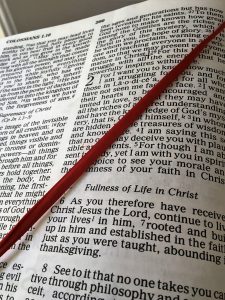Ephesians 5:22-33
This is a profound mystery—but I am talking about Christ and the church (5:32 NIV).
The Biblical passage from which we begin this series is often used to talk about the marital relationship between a husband and a wife. Clearly, it does provide crucial teaching on the sharing of life between the two partners in the marriage covenant. But there is more to these words than the relationship of two humans. Their union is a picture of the greater union of the Lord Jesus Christ and his people. Christ is the husband and the church is his bride. As a man and a woman share life in their marital union, so Christ and his people share life. Marriage is about knowing a person and being known by that same person. Our eternal life with God is about personal knowledge (John 17:3) And knowledge involves communication. So, in this series think of Christ saying to his dearly loved bride, “We need to talk.”
Now on the human side of things, when a man or a woman says to their spouse, “We need to talk,” it is because there is a problem of some kind. Some might be small and others very serious. When one says this phrase, the other might begin to think, “Now what have I done,” and “how can I defend myself?” To ease into this, imagine that a married couple is a party. The husband tells a joke of some sort, that he assumes is simply funny and harmless. But the next thing he knows, his wife comes up to his side and whispers in his ear, “Dear, we need to talk.” Immediately, by her tone, the husband knows he is in trouble! And he is ignorant, and thinking, “Oh no, what did I do or say now?”
In that situation, the husband is probably guilty of some social faux pas. However, we the church are united to the Lord of glory, who is all-wise and never makes mistakes, even when we fail to comprehend his ways. On the other hand, we commit many sins and errors, which require our repentance and faith in his grace to restore our fellowship with him.
For our constant benefit, the Lord Jesus talks to his church through the living Word of God. We don’t need to find a time to talk with him in a busy schedule, which can be difficult for married couples in the busyness of our fast-paced lives. His words are always available, and we can always talk with him (prayer).
This series does not directly speak to the issue of reading the Bible and prayer. A discussion about the latter usually turns into a guilt trip (hardly anyone prays like we all know we should), an excessive concentration on the physical and financial needs of others (who prays for spiritual matters?), or a mystical quest (there are many forms of mysticism in prayer that have little or no connection with the Bible). Dare I even mention attempting to get “Bible believing” Christians involved in reading the Bible regularly? I think it would be easier to encourage believers to wade waist deep through a horrifically smelling swamp for a year than to read the Bible daily for three months! We have a serious problem with distraction or disinterest or disillusionment when it comes to reading God’s word in a consistent manner. Do you think I’m joking? All right… Read First Thessalonians every day for a month. The Spirit might use it to change your life.
Instead, I want to think with you about teachings of the Scriptures that the Lord wants us to pay attention to, as he talks with his dearly loved bride, the church. Christ says to us, “We need to talk;” that is, we need to listen to him about our relationship with him, our worship, our fears, our pride, our lack of passion, our brotherly love, and our need for wisdom. May God our Father give us hearts to listen and grace to change!
Grace and peace, David

 Ruth 3:10-18
Ruth 3:10-18 Ruth 1:3-5
Ruth 1:3-5